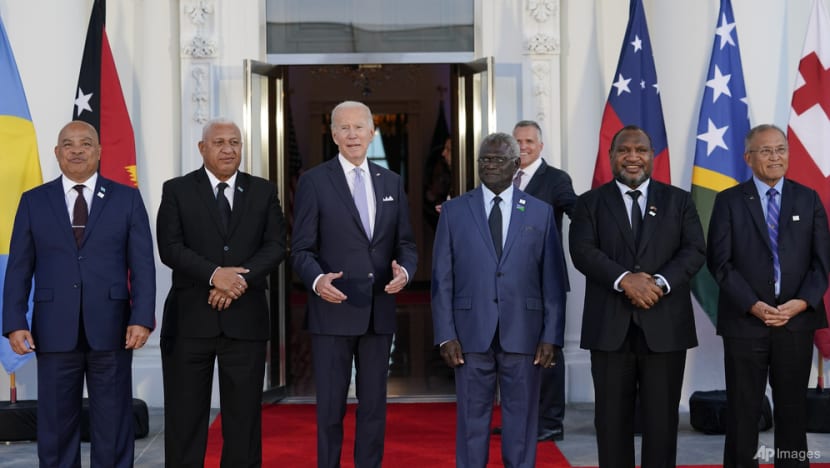Why are global superpowers vying for influence in the Pacific Islands?
The superpower rivalry between China and the United States, in particular, has been felt in the region in recent times.

SINGAPORE: The rivalry between global superpowers for influence in the Pacific islands could risk fragmenting ties among those countries in the region.
However, the geopolitical contest also gives the small Pacific island nations an opportunity to assert their own voice on the global stage, an analyst said.
The Pacific has attracted an inordinate amount of attention from China, Australia and the United States in recent times, as they look to cement their influence.
They have offered security assistance and development aid to the region, where climate change and food scarcity, among other things, are pressing concerns.
OFFERING SECURITY, DEVELOPMENT AID
“Geopolitical competition brings risks, and it brings risks of fragmentation and tensions in the region that are not desirable,” said Dr Meg Keen, director of the Pacific Islands programme at think tank Lowy Institute.
“And the Pacific has been very clear, it does not want the militarisation or securitisation of this region. It wants people to get behind its vision for development and for the development partners to work with them in collaboration, not just looking after their own strategic interests.”
Aid to the region has never been higher, Dr Keen told CNA’s Asia Tonight on Wednesday (Dec 21). “They have more money for regional infrastructure, concessional loans. They're gaining access to greater labour mobility in Australia and in New Zealand.
“They're getting stronger voices in international forums, and we're seeing that with climate change and with oceans governance, because others are aligning with them to get that influence.”
In September, the US struck a partnership deal with the Pacific island nations, which includes a financial aid package to fund various initiatives there.
Meanwhile, Australia has committed about US$610 million in climate, security assistance for the Pacific region.
China also proposed a sweeping economic and security agreement with 10 Pacific nations earlier this year, following its signing of a security pact with the Solomon Islands in April. But the proposal was shelved after many of the countries declined to sign.
Forging a stronger presence in Pacific island nations has become part of the West’s strategy to counter China's security push in the region, according to experts.
“I think what China wants in the Pacific islands is influence. It's a global power and it wants to have a global reach. So that's one thing that's important to it - a presence,” said Dr Keen.
VYING FOR INFLUENCE
For China, the tussle for countries to support its position on Taiwan is crucial.
The Pacific island nations may be small island countries, but there are enormous maritime territories associated with them, said Dr Keen. “China is, of course, a maritime power, and it wants a presence in this area. It's a huge area right in the middle of the Indo-Pacific.”
Dealing with competing interests can be tough, said observers, and when there is money at stake, vested national interests often come first.
Past events have highlighted the geopolitical importance of this region, said observers, adding that the Solomon Islands, for instance, was a pivotal battleground which determined the outcome of World War II.
“Australia and the United States see their security as tightly woven with Pacific island countries,” said Dr Keen. “There are also sea lanes that crisscross this region, and that's important for supply chains for the United States, for Australia and for these countries.
“There's a common geography. Both the United States and Australia share maritime boundaries with these countries and they're very porous.”
The Pacific’s relationship with these Western nations “have been strong and enduring, and they want to keep them that way”, said Dr Keen, whose research focuses on regional security policy and resilience, as well as resource, environmental and human security.
“I think the problem is, you can want to be friends with all for development assistance and to capture development opportunities,” said Dr Keen. “It is not possible to be friends with all when it comes to security issues.”
Citing Solomon Islands Prime Minister Manasseh Sogavare's comments that Australia, in particular, remains the security partner of choice, she said that the Pacific nations, however, “may well go looking elsewhere” if their needs are not met.
“So you can be friends, but you can have preferences as well. And in the Pacific, at the moment, Australia and to another extent the United States have that preference, but they need to maintain it,” said Dr Keen.
“These are sovereign countries, they can choose to go elsewhere if we aren't meeting their needs.”
TACKLING CLIMATE CHANGE
While the Pacific has become a lightning rod for geopolitical tensions, countries there are more concerned about tackling climate change.
The region “will be hit extremely hard” if the goal of limiting the global temperature rise by 1.5 degrees Celsius is not met, said Dr Keen, adding that Pacific nations face various threats that come with climate change such as sea level rises.
“Their greatest security challenge is climate change, not geopolitics. They have made it clear that all countries need to step up,” she said, noting that the superpowers can play an important role in shaping climate action.
“So there's lots more that can be done … to step up our emissions reductions, to step up our climate financing. And to work with them to adapt to the climate issues.”















